KitchenAid Artisan Maximum Extraction Juicer Review
KitchenAid Artisan Maximum Extraction Juicer Review
A beautifully designed but high-maintenance juicer
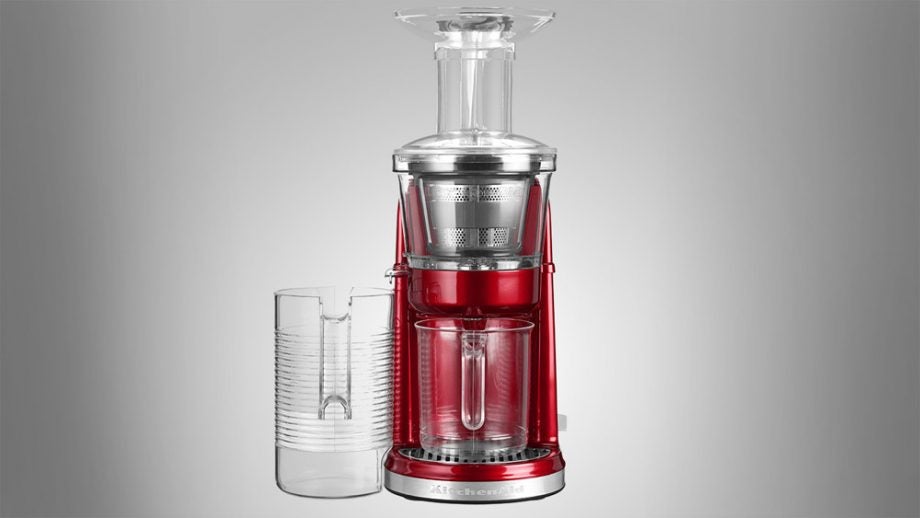
Verdict
Pros
- Two-stage juicing
- Variable pulp screens
- Dishwasher-safe parts
Cons
- Heavy
- Multiple parts to assemble and clean
- No recipe ideas
Key Specifications
- Review Price: £349.00
- High pulp screen, low pulp screen and sauce screen
- 250W
- H45.5 x W17.3 x D29.2cm
What is the KitchenAid Artisan Juicer?
One of the newest additions to the Artisan small appliance range, the Maximum Extraction Juicer is aptly named. Unlike standard centrifugal juicers that use high speed to spin juice out of shredded fruit and vegetables, this machine takes a leaf out of the book of masticating juicers and uses a slow speed to process the contents for more juice and less foam.
Three screens mean you can have your juice the way you like it – with either less or more pulp – and make sauces, great for adding to yoghurt or other dishes. It also comes with a foam screen for the smoothest juice possible and a lid for the juice jug so you can make a large batch to enjoy over a few days.
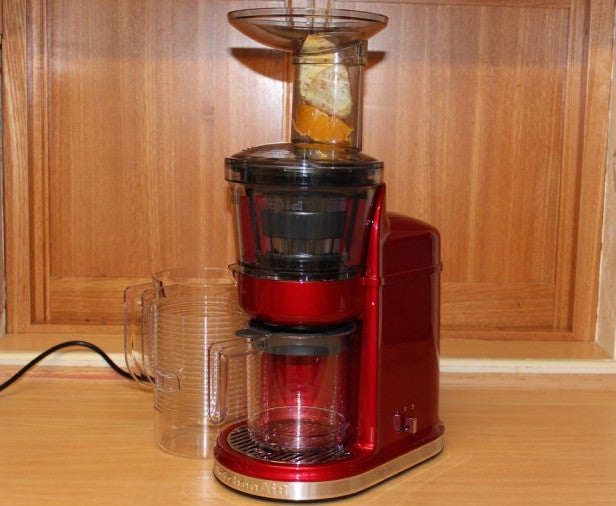
KitchenAid Artisan Juicer – Design
Built to match the rest of the appliances in the range, the Maximum Extraction Juicer comes in a glossy Candy Apple finish and a body made from durable die-cast metal. This adds considerable weight to the machine (it’s 13.52kg) but likewise, keeps it firmly planted on the worktop as it juices and there’s little need to move it with a generous 119cm power cord. The removable parts are made from plastic and stainless steel and can all be popped in the dishwasher to keep them sparkling.
Several design features make the juicing process as easy as possible. A scooped hopper at the top makes it simple to pile in small items, such as berries, without them scattering, and a removable drip tray at the bottom means there’s minimal splashes on the main body of the machine to clean up. The blades are built into an auger with a screw-style thread running around it and holes for fingers to safely hold it, which slices fruit and vegetables before squeezing out the juice.
A slider switch controls the function of the machine – there’s only one speed and a reverse to clear clogs, while the open or closed position of the pulp chute dictates whether the contents will be separated into juice and pulp or one mixture (when making sauce).
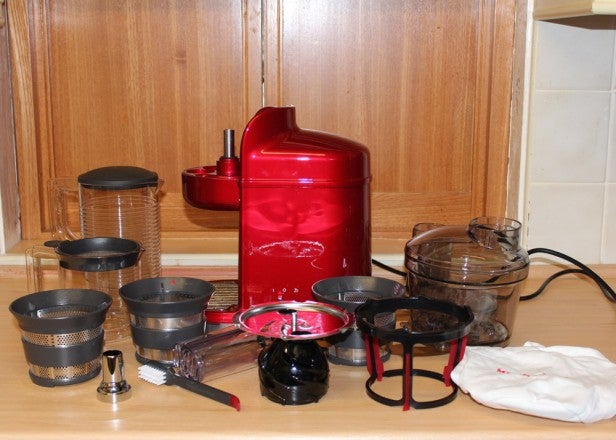
KitchenAid Artisan Juicer – What’s it like to use?
The Maximum Extraction Juicer has many great features but unfortunately, the result is many parts. Putting it together the first time is a daunting task – but thankfully, there’s a step-by-step mini guide that can be kept nearby until it’s second nature. There’s some guidance as to which foods to juice and how to get the best results from different types, but without any recipes, putting together combinations of juice means there’s a bit of guesswork involved.
We started by juicing oranges using the low pulp screen. While citrus fruit has to be peeled and any large pips removed, the wide feeding tube means halves and quarters of fruit can be popped straight in without any further prep. The machine quickly juiced a couple of oranges, relatively dry pith coming out the pulp chute and a good quantity of juice per fruit. Some bits were left on the blades but the rest was processed. The foam screen additionally removed any remaining particles, meaning the resulting juice was excellent quality – smooth and thicker than supermarket juices.
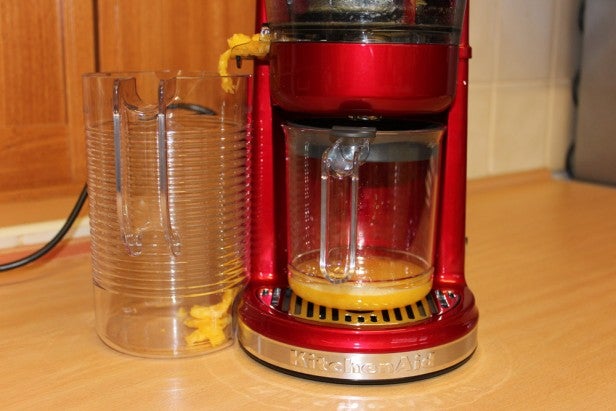
Next, we juiced some leafy greens – kale and spinach – with the high pulp screen. The machine recommends juicing these along with watery or fibrous fruit or vegetables for a higher juice yield, so we added some cucumber, too. True to form, more foam and sediment was produced but also, a reasonable amount of juice for the contents. Finally, we made some blueberry purée using the sauce screen. The machine processed the berries quickly and made almost half a jug of sauce that had the consistency of a smoothie.
No matter what goes in the Maximum Extraction Juicer, the noise is minimal, making it ideal for an open-plan kitchen. Once disassembled, cleaning the machine isn’t difficult but does take a little longer than other juicers. Some of the parts, such as the screens, juicing bowl and blade, need a quick scrub with the included cleaning brush to free them from clumps of pulp before they can be popped in the dishwasher or washed by hand.
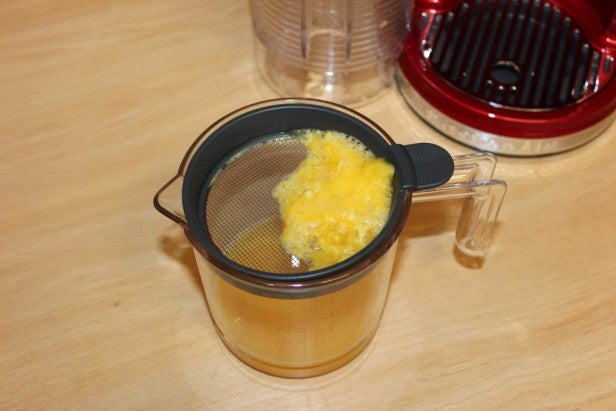
Should I buy the KitchenAid Artisan Juicer?
If you’re new to juicing, this probably isn’t the best machine to start with, as assembling and disassembling it could be enough to put you off the habit. Where it comes into its own though, is for those who already love juicing and are ready to upgrade to a machine that has a high yield, is great for experimenting with different foods and will last a lifetime.
There are a lot of smart features that put it head and shoulders above basic models, such as the option of making sauce, which means it could also come in handy when making desserts.
Verdict
A beautifully designed machine that’ll get the most of out your food, looks good and runs smoothly, but its assembly could deter a first-time juicer.

